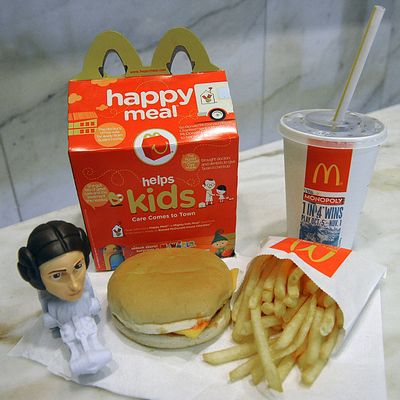
Yesterday, New York City councilmember Ben Kallos introduced legislation that would prohibit fast-food restaurants from including toys in unhealthy kids’ meals — with “unhealthy” defined here as meals with more than 500 calories and 600 milligrams of sodium. It’s an echo of similar plans enacted recently in California, and a recent Robert Wood Johnson–funded report suggests this could be a pretty effective way of making healthier foods appear more alluring to kids.
There isn’t yet a ton of research into this area, but the ones that do exist seem to back this idea. Anna McAlister, a marketing professor at Michigan State University, is the author of one of those studies, which was published in 2012, and she explained her findings in an email to Science of Us:
Kids will choose the healthier meal instead of the fast food when the healthier meal comes with a toy and the fast food has no toy. If both meals have a toy, then the meals are equally chosen. In other words, you need a restriction like the NYC one in order to get kids to shift their behavior.
So it’s the toy that’s the big draw for kids, not the food. And restaurants know this: In 2009, more than half of the marketing budget for the world’s top fast-food chains went to toys or other trinkets to be included in kids’ meals, according to the Federal Trade Commission.
But there’s a catch! There’s always a catch. Just because kids are drawn to the toy doesn’t mean they’ll eat the healthy food that comes along with it, McAlister said. Not to mention that people get touchy when it comes to anything seen as “banning” something that was previously allowed. And children’s meals at fast-food chains have slowly undergone a healthier makeover, anyway; in 2008, the Center for Science in the Public Interest found that just one percent of kids’ meals at restaurants were nutritionally sound according to industry standards, but by 2012, that had risen to 3 percent.
“So that definitely is progress,” said Jennifer Harris, director of marketing initiatives at the Yale Rudd Center for Food Policy and Obesity. “We’d always like them to do more. But at least they seem to be trying to address these issues.”




